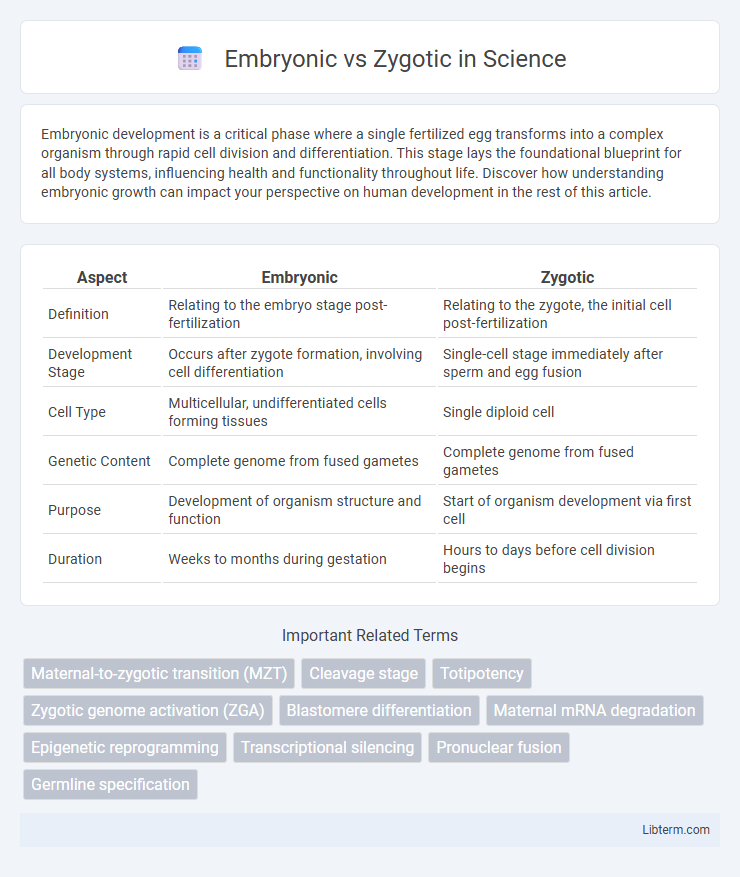Embryonic development is a critical phase where a single fertilized egg transforms into a complex organism through rapid cell division and differentiation. This stage lays the foundational blueprint for all body systems, influencing health and functionality throughout life. Discover how understanding embryonic growth can impact your perspective on human development in the rest of this article.
Table of Comparison
| Aspect | Embryonic | Zygotic |
|---|---|---|
| Definition | Relating to the embryo stage post-fertilization | Relating to the zygote, the initial cell post-fertilization |
| Development Stage | Occurs after zygote formation, involving cell differentiation | Single-cell stage immediately after sperm and egg fusion |
| Cell Type | Multicellular, undifferentiated cells forming tissues | Single diploid cell |
| Genetic Content | Complete genome from fused gametes | Complete genome from fused gametes |
| Purpose | Development of organism structure and function | Start of organism development via first cell |
| Duration | Weeks to months during gestation | Hours to days before cell division begins |
Introduction: Defining Embryonic and Zygotic Stages
Embryonic and zygotic stages represent distinct phases in early development, where the zygotic stage begins at fertilization when the sperm and egg nuclei fuse to form a zygote. The embryonic stage follows, encompassing cell division, differentiation, and morphogenesis leading to the formation of the embryo. Understanding these stages is fundamental for studying developmental biology, genetics, and reproductive science.
Formation: From Zygote to Embryo
The formation process from zygote to embryo begins with the fertilized egg, known as the zygote, which undergoes rapid cell division called cleavage. This leads to the formation of a multicellular structure called the blastocyst, marking the transition to the embryonic stage. During embryogenesis, cellular differentiation and morphogenesis occur, shaping the developing organism from the initial zygotic single cell.
Cellular Processes: Zygotic Division vs. Embryonic Development
Zygotic division begins immediately after fertilization, involving rapid mitotic cleavage that increases cell number without growth, forming a multicellular structure called the morula. Embryonic development follows, characterized by cellular differentiation and morphogenesis, where cells specialize and organize into distinct tissues and organs. These processes are regulated by gene expression patterns and signaling pathways that ensure proper cell fate determination and tissue formation.
Genetic Activation: Zygotic Genome Activation vs. Embryonic Expression
Zygotic genome activation (ZGA) marks the transition when the embryo's genome begins transcribing its own RNA, replacing reliance on maternally deposited transcripts during early embryonic development. In contrast, embryonic expression initially depends on maternal mRNA and proteins until robust zygotic transcription initiates, typically occurring at the mid-blastula transition in many species. This switch from maternal to zygotic control is crucial for regulating genes involved in cell differentiation, development, and growth.
Morphological Changes: Zygotic Simplicity vs. Embryonic Complexity
Zygotic development features simpler morphological changes, characterized by basic cell division and minimal differentiation immediately following fertilization. Embryonic development exhibits complex morphological alterations, including extensive cell differentiation, tissue formation, and organogenesis. These differences highlight the transition from a single totipotent zygote to a multicellular, structurally diverse embryo.
Key Functions: Roles of Zygote and Embryo in Development
The zygote functions as the initial single-cell formed after fertilization, carrying the combined genetic material from both parents and initiating the process of rapid cell division known as cleavage. The embryo, developing from the zygote, undergoes cellular differentiation and morphogenesis, establishing the foundational tissues and organs of the organism. Key roles of the zygote include genome activation and preparation for multicellular development, while the embryo orchestrates pattern formation and organogenesis essential for proper growth.
Temporal Differences: Zygotic Stage Duration vs. Embryonic Timeline
The zygotic stage, immediately following fertilization, typically lasts only a few hours as the single-celled zygote undergoes initial cleavage divisions. In contrast, the embryonic timeline extends much longer, encompassing the period from early cell division through the formation of major organs and tissues, often spanning several weeks in mammals. Temporal differences highlight the zygotic stage as a brief, crucial phase initiating development, while the embryonic timeline involves complex morphogenesis and differentiation processes over an extended duration.
Significance in Fertilization and Reproduction
Embryonic development begins immediately after zygotic formation, with the zygote representing the single-celled product of fertilization containing a complete set of parental DNA. The zygote's significance lies in its totipotency, enabling it to differentiate into all cell types necessary for forming a viable embryo and initiating pregnancy. Understanding the transition from zygotic to embryonic stages is crucial for insights into early reproductive success and developmental biology.
Implications in Research and Biotechnology
Embryonic cells, derived from early-stage embryos, exhibit pluripotency and are fundamental in stem cell research and regenerative medicine, allowing for the development of diverse cell types and tissues. Zygotic cells, originating from the fertilized egg, serve as the initial totipotent stage and provide critical insights into early developmental gene regulation and epigenetic reprogramming. Understanding the distinct characteristics of embryonic and zygotic cells drives advancements in genetic engineering, therapeutic cloning, and personalized medicine by enabling precise manipulation of cellular differentiation pathways.
Conclusion: Comparative Overview and Future Directions
Embryonic development initiates with the formation of the zygote, a single-cell embryo resulting from fertilization, which undergoes rapid cellular division and differentiation. Comparative analyses highlight that while zygotic stages emphasize genome activation and totipotency, embryonic stages focus on tissue specialization and morphogenesis. Future research will likely explore advanced genomic and epigenetic techniques to enhance understanding of developmental disorders and improve regenerative medicine applications.
Embryonic Infographic

 libterm.com
libterm.com